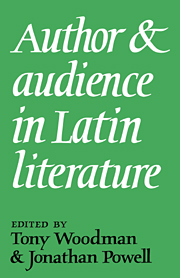Book contents
- Frontmatter
- Contents
- List of contributors
- Prologue
- 1 THE ORATOR AND THE READER: Manipulation and response in Cicero's Fifth Verrine
- 2 STRATAGEMS OF VANITY: Cicero, Ad familiares 5.12 and Pliny's letters
- 3 ‘SHALL I COMPARE THEE…?’: Catullus 68B and the limits of analogy
- 4 ATOMS AND ELEPHANTS: Lucretius 2.522–40
- 5 IN MEMORIAM GALLI: Propertius 1.21
- 6 THE POWER OF IMPLICATION: Horace's invitation to Maecenas (Odes 1.20)
- 7 THE VOICE OF VIRGIL: The pageant of Rome in Aeneid 6
- 8 FROM ORPHEUS TO ASS'S EARS: Ovid, Metamorphoses 10.1–11.193
- 9 POET AND AUDIENCE IN SENECAN TRAGEDY: Phaedra 358–430
- 10 PERSIUS' FIRST SATIRE: A re-examination
- 11 NERO'S ALIEN CAPITAL: Tacitus as paradoxographer (Annals 15.36–7)
- 12 AMOR CLERICALIS
- 13 EPILOGUE
- Notes
- Abbreviations and bibliography
- Indexes
1 - THE ORATOR AND THE READER: Manipulation and response in Cicero's Fifth Verrine
Published online by Cambridge University Press: 13 March 2010
- Frontmatter
- Contents
- List of contributors
- Prologue
- 1 THE ORATOR AND THE READER: Manipulation and response in Cicero's Fifth Verrine
- 2 STRATAGEMS OF VANITY: Cicero, Ad familiares 5.12 and Pliny's letters
- 3 ‘SHALL I COMPARE THEE…?’: Catullus 68B and the limits of analogy
- 4 ATOMS AND ELEPHANTS: Lucretius 2.522–40
- 5 IN MEMORIAM GALLI: Propertius 1.21
- 6 THE POWER OF IMPLICATION: Horace's invitation to Maecenas (Odes 1.20)
- 7 THE VOICE OF VIRGIL: The pageant of Rome in Aeneid 6
- 8 FROM ORPHEUS TO ASS'S EARS: Ovid, Metamorphoses 10.1–11.193
- 9 POET AND AUDIENCE IN SENECAN TRAGEDY: Phaedra 358–430
- 10 PERSIUS' FIRST SATIRE: A re-examination
- 11 NERO'S ALIEN CAPITAL: Tacitus as paradoxographer (Annals 15.36–7)
- 12 AMOR CLERICALIS
- 13 EPILOGUE
- Notes
- Abbreviations and bibliography
- Indexes
Summary
The title of this book must not be taken too literally but needs interpretation by the reader. Though much Latin literature suggests the presence of an audience, it was recorded not on tape but papyrus. Speeches have a notably ambiguous status: they reconstruct the style and techniques of living oratory, but once they were issued to the world they were no longer spoken. Not even the content need be the same, for in his published versions Cicero added political manifestos (as in the Pro Sestio), omitted procedural technicalities (everywhere), or shifted his stance to suit a developing situation (as in the Catilinarians). He expanded some remarks against Piso into a comprehensive invective, he never spoke the famous Second Philippic, and the Pro Milone that failed is not the one that we have. The present essay deals with the Fifth Verrine, which purports to have been delivered in 70 B.C. at the trial of Verres for extortion as governor of Sicily, but as the defendant withdrew into exile after the first preliminaries, not a word was actually uttered. Even if Cicero had a draft of the speech ready for delivery, he would rewrite it in a triumphal spirit when he knew that he had won. He was now not so much persuading a jury as justifying a successful prosecution.
A problem of presentation arises with any discussion of Cicero's speeches: the text goes on for so long that comment soon becomes diffuse. To meet this difficulty I shall concentrate on a fiftieth part of the Fifth Verrine, a page deploring the destruction of a Roman fleet by the pirates near Syracuse (5.92–5).
- Type
- Chapter
- Information
- Author and Audience in Latin Literature , pp. 1 - 17Publisher: Cambridge University PressPrint publication year: 1992
- 4
- Cited by

